
CUC invites you to join our 2025 cohort of SCPI, where conflict resolution professionals commit to exploring together practices of self-reflection that are constructive for ourselves and productive for our clients.
Together we will:
- Learn about compassionately connecting with and understanding, in the context of our various histories, positions, and intersections, our deeper impulses fueling our commitment to working with people in conflict.
- Recognize barriers to self-understanding and constructive presence, such as general reactivity, judgment, insecurity, anger, or the desire for control.
- Work with those barriers in ways that bring us closer to ourselves and our clients.
- Explore SCPI concepts and skills through the specific experiences of cohort participants.
- Discuss how to integrate inner experience and external action.
Participants will practice various self-reflection methods during six group online sessions over four months (approximately 1 three hour group session every three weeks), individual daily practice between sessions individually, and 1-1 weekly peer meetings.
This program is for anyone whose work includes helping people navigate conflicts, including mediators in various community and professional contexts, human resource managers, team leaders, volunteer coordinators, ombudspersons, lawyers, mental health and financial and fiduciary professionals, and other similar professionals. Participants can be previously trained in or identified with the CUC understanding-based model, but it is not a requirement.


View this video for more information about the program, including past participant feedback.
DATES AND TIMES FOR ONLINE GROUP SESSIONS VIA ZOOM
9:00 AM – 12:00 PM PST on the following dates in 2025:
All dates are Fridays.
COST
- A copy of Inside Out: How Conflict Professionals Can Use Self-Reflection to Help Their Clients by Gary Friedman. Paper copies are available for purchase through online stores for approximately $35 – 55.
- Their own self-selected or crafted paper journal for use throughout the program.
REGISTRATION


FACILITATORS
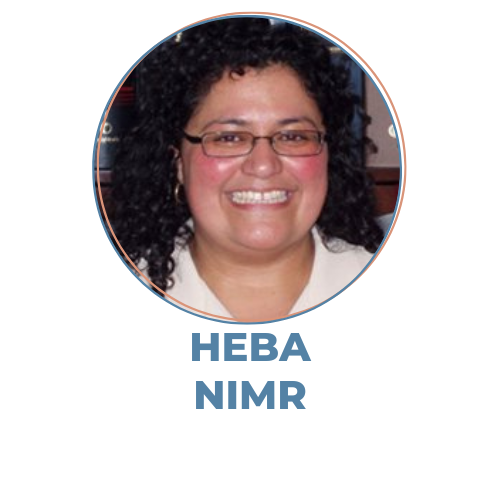
Heba Nimr has worked in various capacities for more than 30 years with families and organizations challenging systemic barriers to equity, as well as navigating interpersonal conflicts and abuse. Heba brings and builds on those experiences in her current practice, based in Oakland for ten years and counting, as a lawyer and mediator focused primarily in the areas of family law, and life, legacy and death planning. She has particular strength and interest in conflict resolution in multicultural and multilingual settings.
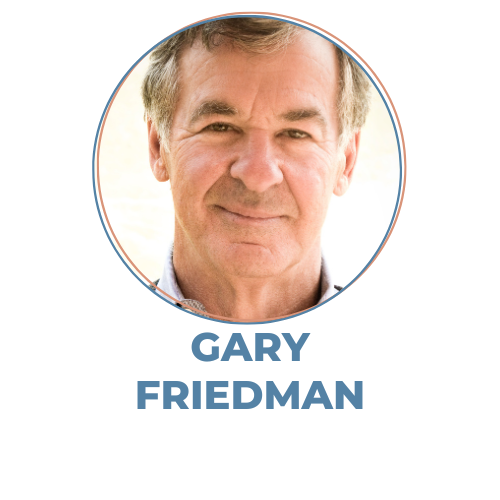
Gary J. Friedman has been practicing law as a mediator with Mediation Law Offices in Mill Valley, California since 1976, integrating mediative principles into the practice of law and the resolution of legal disputes. Co-founder of the Center for Understanding in Conflict (formerly the Center for Mediation in Law), he has been teaching mediation since 1980. Prior to his work as a mediator, he practiced law as a trial lawyer with Friedman and Friedman in Bridgeport, Connecticut. After several years as an advocate, he sought a new approach to resolving disputes through increasing the participation of the parties in the resolution of their differences. At that time, he and his colleague, Jack Himmelstein, began to develop the Understanding-based model that is now practiced extensively in the United States and Europe.
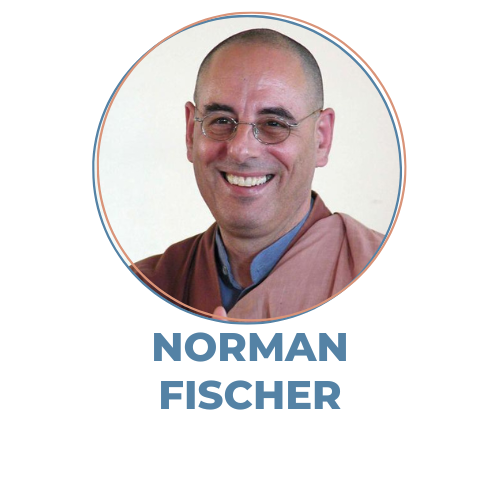
Norman Fischer is a poet, author, Zen Buddhist priest and former abbot of the San Francisco Zen Center. As founder of the Everyday Zen Foundation (www.everydayzen.org), his work with meditation practice has taken him into many corners of contemporary American life including the arts, education, hospice training, education, and lawyering as a spiritual path. Recently, he began offering meditation training to engineers at Google. Norman has worked with the Center for Understanding in Conflict on inquiries that focus on bringing the calmness and insight of meditation practice directly into conflict situations. Norman has written 29 books. His latest books are Untitled Series: Life As It is and The World Could Be Otherwise: Imagination and the Bodhisattva Path.
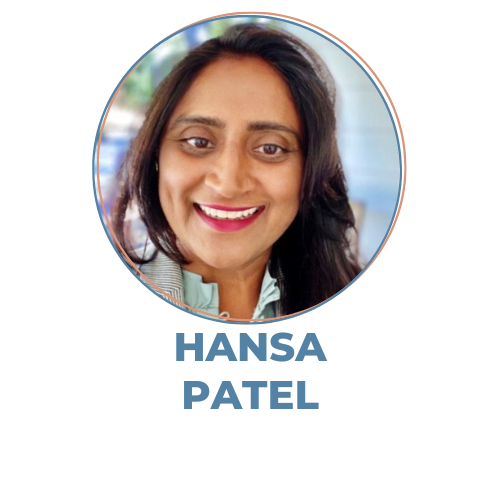
Hansa Patel is an attorney, mediator, and teacher. As an attorney, Hansa zealously advocated for abused and neglected children or defended their parents’ rights in the San Francisco juvenile dependency court for fourteen years. Hansa is passionate about serving the underprivileged community. Feeling depleted by the court system, Hansa explored new ways to empower her clients to resolve conflict. Mediation empowers Hansa’s clients to choose how they want to engage with conflict, co-create resolutions, and even transform a relationship. In the USA, Canada, and Africa, Hansa teaches mediation, including integrating mindfulness skills into conflict resolution. Hansa wants her clients to have the same tools she cultivates in her children: a mindful approach to resolving challenges in life.
Going Inside to Help Those Outside with Gary Friedman
Mindfulness in Mediation with Norman Fischer
Mindfulness and Understanding with Guest David Dörken
About Inside Out
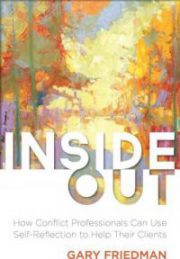 Read Gary Friedman’s Book Inside Out: How Conflict Professionals Can Use Self-Reflection to Help Their Clients to learn more.
Read Gary Friedman’s Book Inside Out: How Conflict Professionals Can Use Self-Reflection to Help Their Clients to learn more.
Gary Friedman presents how to access your internal selves when working with people in conflict in a way that is constructive for clients. This practical guide for conflict professionals directs the reader to pay attention to emotional clues – which can unearth unacknowledged feelings, concerns, and priorities that can be central to resolving the conflict if we understand and communicate them. Combining external dimensions with internal world (attitudes, relationships, feelings) a conflict professional and determine the best course of action for all parties involved.
This book, is based on a program that Gary Friedman, along with colleague Jack Himmelstein (a law professor and lawyer) and Norman Fischer (a Buddhist monk) has been teaching for the last 18 years. It entails conflict professionals to consider self-reflection, challenging typical conventions of conflict professionals by replacing them with a full and deep commitment to bringing all of one’s self to serve others. Essentially – acknowledging and using self-awareness. Working from the inside out.
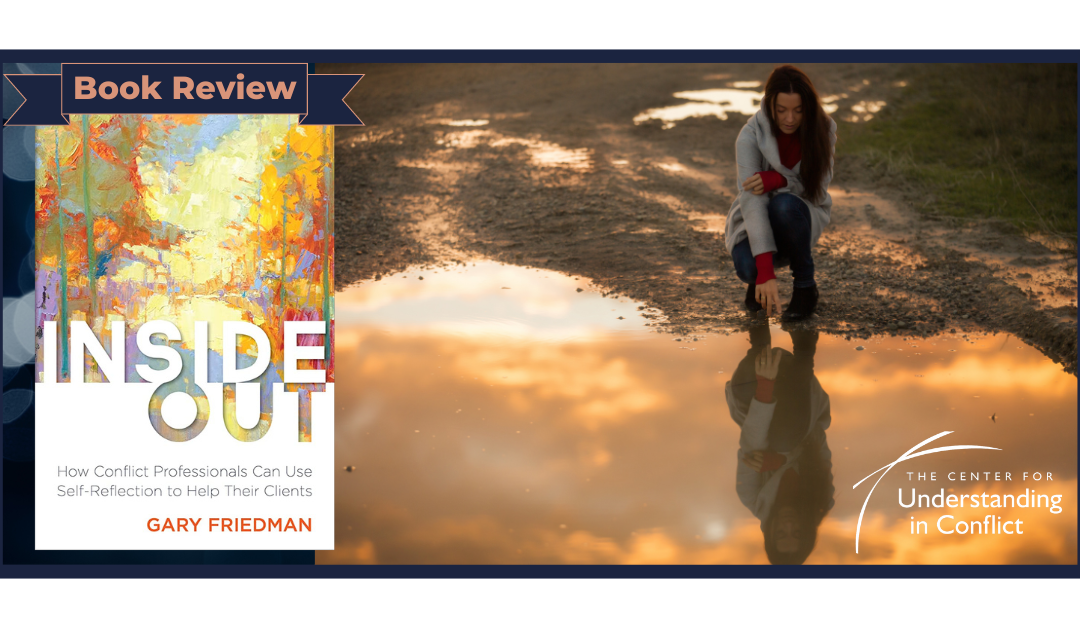
Inside Out: How Conflict Professionals Can Use Self-Reflection to Help Their Clients
Inside Out: How Conflict Professionals Can Use Self-Reflection to Help Their Clients by Gary J. Friedman is an insightful and thought-provoking book authored by a renowned expert in conflict resolution. This book serves as a valuable guide to understanding the crucial role of self-reflection in helping clients navigate challenging conflicts with a focus on the personal and internal dimensions of conflict resolution. When working with clients, Friedman emphasizes the importance of conflict professionals examining their biases, beliefs, and emotional responses. By delving into self-reflection, practitioners can better understand their triggers and how they may influence their interventions. This awareness ultimately enhances their ability to guide clients and effectively manage conflicts neutrally and empathetically.
Written in an engaging and accessible way, Inside Out makes the concepts and ideas presented throughout easily relatable, and real-life case studies and practical examples effectively demonstrate the application of self-reflection techniques in conflict resolution scenarios. These anecdotes help readers connect theory to practice, making the book a valuable resource for experienced professionals and those new to the field. One of the most compelling aspects of this book is its emphasis on the interconnectedness of personal and professional growth. The author makes a convincing argument that conflict resolution practitioners must embark on their own journey of self-discovery and growth to assist their clients effectively. While sharing his own experiences and insights, Friedman encourages readers to engage in self-reflection, promoting a culture of continuous learning and development within the conflict resolution profession.
Another strength of Inside Out is its comprehensive exploration of various self-reflection techniques and strategies. The book offers a range of practical exercises, reflection prompts, and assessment tools that conflict professionals can utilize to enhance their self-awareness. These resources enable readers to engage actively with the material, fostering personal growth and transformation. Moreover, the book guides integrating these self-reflection practices into daily professional routines, ensuring sustained development. Inside Out also addresses the potential challenges and ethical considerations that may arise when employing self-reflection in conflict resolution and encourages practitioners to navigate the fine line between self-awareness and self-indulgence, highlighting the importance of maintaining professional boundaries and accountability. By presenting these challenges alongside practical solutions, the book equips conflict professionals with the necessary tools to navigate the complexities of their roles ethically.
Inside Out: How Conflict Professionals Can Use Self-Reflection to Help Their Clients is an exceptional resource for conflict resolution practitioners seeking to enhance their effectiveness. Through its exploration of self-reflection techniques and strategies, the book empowers professionals to examine their biases, emotions, and triggers, ultimately enabling them to assist their clients better. With its practical approach, engaging writing style, and comprehensive coverage of the subject matter, this book is a must-read for anyone working in the field of conflict resolution.